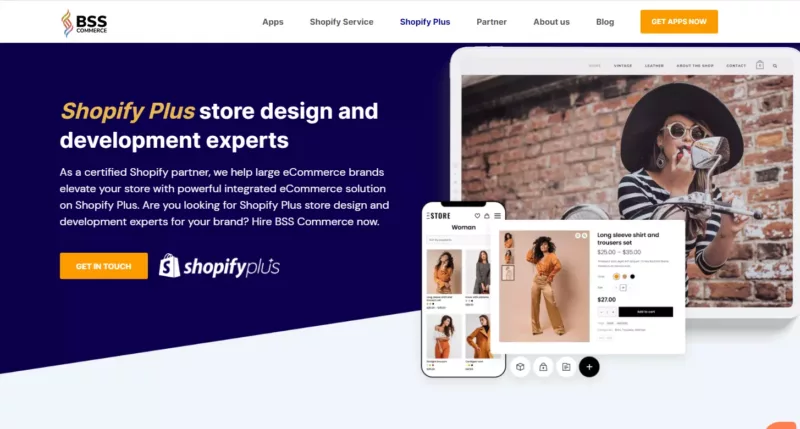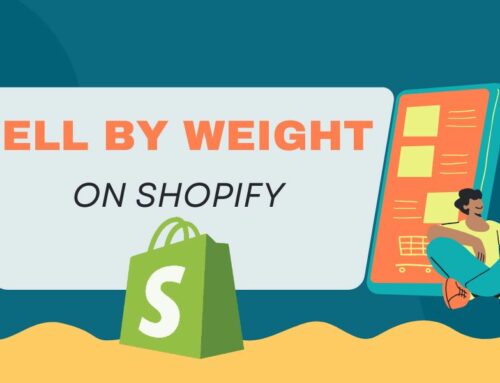The eCommerce market is constantly fluctuating, especially with the ever-evolving technology era. As 2022 has come, it’s time to look at the B2B eCommerce trends your company needs to be aware of to stay competitive and increase online sales. Despite the two-year-long public health discussion, COVID-19 remains the critical driver of change.
If you did not capitalize on these developments in 2021, you would have another opportunity to strengthen your marketing and sales strategy. In B2B eCommerce, 2022 is projected to further push the limit. This post will show you the best of the greatest.
Contents
B2B eCommerce Stats 2021: The Premise B2B eCommerce Trends 2022
According to Digital Commerce 360, online sales on B2B eCommerce sites, log-in portals, and marketplaces will climb 17.8 percent to $1.63 trillion by 2021. According to Statista, the North American B2B eCommerce market will exceed $4,600 billion by 2025.
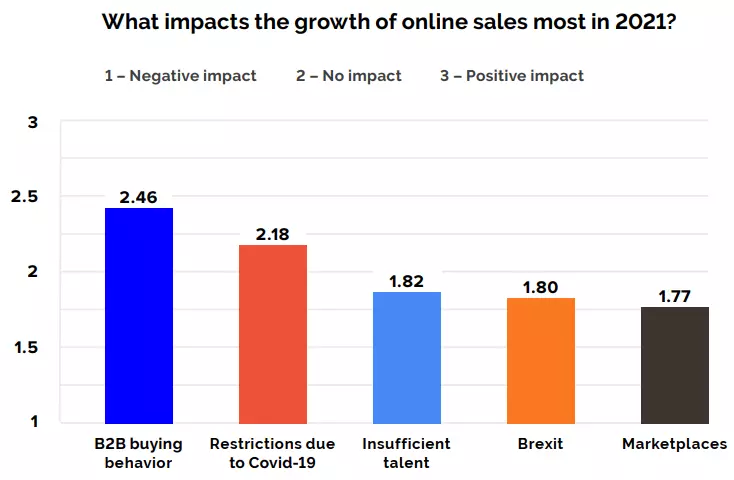
In fact, eCommerce is no longer a fashionable new channel that B2B enterprises are experimenting with. With COVID-19 emphasizing the importance of digital, McKinsey & Company forecasts that by 2022, B2B marketers have shifted 55% of their spending to online activities, with 96% of larger firms overhauling their go-to-market strategy to highlight digital channels and support/service. Besides, B2Bs are more likely to offer eCommerce than in-person transactions for the first time.
Businesses are looking to B2C as a model as they try to adapt to the new reality. Therefore, they are stepping up their investments in mobile, digital payments, online marketplaces, and overall infrastructure to make the B2B experience more omnichannel, frictionless, personal, and self-directed.
However, 52% of B2B buyers are dissatisfied with their online purchasing experience. Even worse, 90% of B2B buyers would switch to a competitor if a supplier’s digital channel couldn’t keep up with their demands.
Thus, B2Bs must prioritize digital transformation in 2022 to provide the shopping experiences that buyers have come to expect.
Let’s take a closer look at some of these B2B eCommerce trends and how they’ll affect the market’s continuous evolution in the following years.
B2B eCommerce Trends: Strategic Trends
Brand Strategy In The Metaverse
You’ve probably heard about Mark Zuckerberg’s ambitious goal of pioneering the metaverse and his company’s rebranding as “Meta.” This is since businesses will have to start paying attention to the metaverse.
In a nutshell, the metaverse is an online environment in which humans interact as avatars. It’s almost like a virtual extension of the real world. Online games such as Roblox and Fortnite are examples of popular metaverse environments.
Creating a location for your brand in the metaverse should be at the top of your to-do list if you want to keep up with the ever-growing digital channels. There are millions of ways to go about this. For example, NASCAR’s book illustrates how firms might begin advertising and raising brand recognition in virtual reality environments.

Specifically, it has built a foothold in an already existing metaverse realm by producing a branded virtual automobile within the Roblox game Jailbreak. The firm organized a competition for NASCAR fans to build their own “skin” for a virtual car, and two ideas were chosen to premiere on it.
Invest In eCommerce Platform Technology
Your B2B eCommerce platform is a great place to start if you’re planning your digital transformation because it can serve as the hub of your digital ecosystem. Indeed, investing in eCommerce platform technology is one of the trends in B2B eCommerce for 35% of US B2B companies.
However, not all eCommerce systems are created equal. Many still function as a monolith, or one-size-fits-all solution, which means you don’t have the freedom to find the best solution for your specific needs.
Platforms that do not genuinely enable B2B eCommerce capability are on the opposite end of the spectrum. Instead, they may provide a few extra features or workarounds.
Reliable Shopify development agencies, such as BSS Commerce, provide all of the benefits of technology solutions, such as robust security, rapid innovation, a lower total cost of ownership, and features that support the complexities of B2B.
Another vital thing to consider is the compatibility of which it may be integrated with your other business systems. And BSS Commerce can assist you in extending the potential of your store by integrating third-party systems like ERP, CRM, and marketplaces. BSS Commerce provides a consistent and smooth eCommerce experience that adds value to businesses and customers.
Are you looking for development experts to help catch up with B2B eCommerce trends in 2022? Contact BSS Commerce Shopify now!
B2B Marketplaces
According to a BE Shaping the Future report, marketplaces have a lot of space to grow and become one of the B2B eCommerce trends 2022. This prediction is due to the industry’s relative lack of maturity, particularly when contrasted with the B2C marketplace market, where Amazon, Alibaba, and Taobao have established themselves as clear leaders. All of this generates enormous prospects for B2B markets in industries including manufacturing, distribution, franchising, corporate and government procurement, etc.
Indeed, many B2B customers discover inspiration and begin their product hunt in marketplaces. Not only that, but Amazon Business is used by 15% of US customers and 20% of UK purchasers — and that’s just one of several third-party B2B marketplaces.
The potential of third-party marketplaces to acquire new clients is one of their most significant advantages. This would increase revenue, but it will also provide an opportunity to enter worldwide markets and test new goods.
Gartner predicts that by 2023, 15% of mid-to-large B2B brands will build their marketplaces, and 70% of all marketplaces will support B2B transactions. As a result, sellers will find it more challenging to manage the channel efficiently. Businesses will need to be pickier about which marketplaces they use to maintain their success. They will need to rely more on comprehensive marketplace management software to support a wide range of outlets and sophisticated marketing and personalization campaigns.
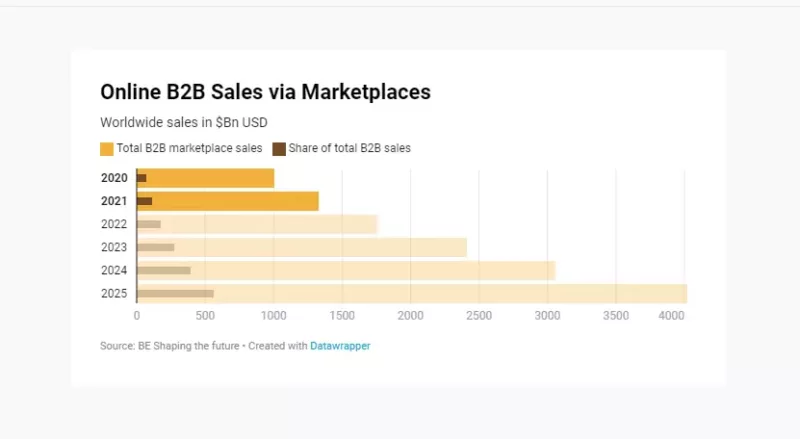
Read More: Shopify Plus Marketplace – Is It A Good Choice For You?
Omnichannel Selling
The year 2021 established omnichannel selling as the industry norm for B2B companies. Customers can make purchases or shop around via various channels, such as traditional ways, remote interactions, or self-service choices, using omnichannel selling. It is still considered one of the trends in B2B eCommerce.
According to a recent McKinsey survey, the omnichannel is becoming the new standard, with 80 percent of B2B leaders preferring it over the old model and 64% aiming to boost hybrid sellers in the next six months.
B2B vendors aren’t the only ones embracing the new model, with omnichannel-based transactions increasing by 43% in the last year. Buyers, too, are embracing omnichannel and are more likely to make significant purchases through a remote/digital sales model, with 20% now comfortable making a $500k or larger buy through this non-traditional channel.
Read More: Top 10+ Best Store Locator Shopify App For Selling Omnichannel
Mobile Commerce

The growing use of mobile for B2B research and purchasing neatly encapsulates the need for an omnichannel strategy. According to a recent Google and BCG study, mobile accounts for at least 70% of B2B searches. And it influences 40% of revenue. Moreover, mobile device purchases accounted for roughly 73% of eCommerce sales in 2021.
90% of B2B buyers reported that they would be more likely to repurchase from a company that provides a superior mobile experience. Being left behind outweighs the risks represented by unfamiliarity, underperformance, and the other primarily existential fears that are preventing wider adoption.
Therefore, adopting and investing in a mobile strategy will be critical for any B2B organization. Keeping up with trends in B2B eCommerce can help you sustain and expand your eCommerce income in the future, especially as more Millennials and younger digital generations assume leadership roles.
Companies Lean Into Sustainability
As worldwide awareness of climate change grows, many businesses launch sustainability efforts. And while these objectives are beneficial to the environment, they are also helpful to business. After all, statistics show that environmentally-conscious companies have 4.3 times the client loyalty., and conversion rates can increase by up to 20%.

Using sustainable packaging is an excellent method to demonstrate your company’s commitment to sustainability. Avery Dennison, an eCommerce B2B label manufacturer, employs this strategy in its business to ensure that clients are delighted with the way their items arrive.
Whether it’s packaging, product materials, or lowering energy use in production, finding ways to be more environmentally friendly will be crucial in the coming years.
B2B eCommerce Trends: Customer Experience Trends
Self-Service Portals
The research from last year forecasted significant growth and investment in markets, cloud adoption, security, and other areas. We anticipate a slightly different scene in 2022, with a more vital interest in self-service portals. Marketplaces will continue to dominate. And brands will proceed with care and within the context of their broader B2B eCommerce strategy.
Self-service is desired by 81 percent of enterprise customers, according to a Frost & Sullivan poll. Self-service solutions allow B2B enterprises to interact with customers in novel ways, resulting in enhanced productivity and cost savings. As we approach 2022, B2B consumers will increasingly prefer to address problems on their own using online tools rather than contacting support.
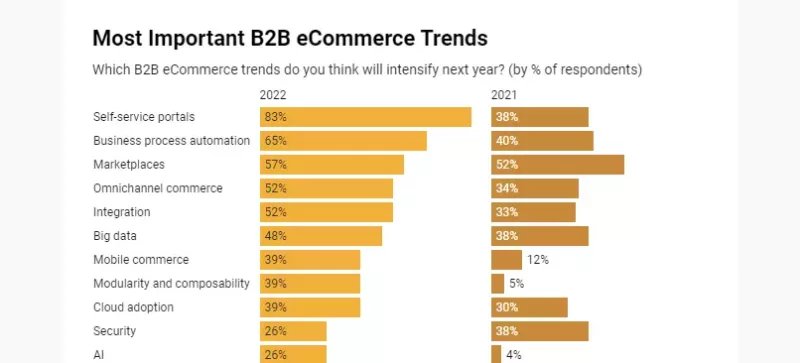 Source: ORO Commerce
Source: ORO Commerce
Having a self-service online portal is one of B2B eCommerce trends 2022, which help streamlines the procedure for each company and assures that they can easily handle their orders through this online marketplace.
Personalized Experiences
Personalization is essential for creating a purchasing experience that makes your customers feel valued. It includes strategies such as:
- Personalizing product recommendations based on previous pages seen by clients
- Using remarketing attempts to persuade hesitant clients to buy
- Creating advertisements centered on abandoned carts to remind clients of products they may have forgotten.
According to research, 50% of B2B buyers regarded increased personalization as a significant quality when seeking online suppliers to create partnerships, with consumers paying 48% more when their experience is individualized.
Artificial intelligence is one of the trends in B2B eCommerce. MoEngage studied worldwide consumers in 2021 to learn how they felt about various brand interactions. According to the findings, customers worry less about the quantity or location of communication and more about whether the interactions are relevant.
One of the reasons many B2Bs prefer headless commerce is that it makes creating and delivering customized buying experiences easier.
Aside from headless commerce, numerous personalization solutions use AI and machine learning to create customer segments. It also enables marketers to take immediate action through recommendations, triggered emails, automatic optimization, and real-time messaging.

Read More: How To Create Shopify B2B Experience With Available Apps On The Market
Prioritize Product Discovery And Information
Finding products is a significant source of frustration for B2B buyers who shop online. Even if they can locate the products, they still have difficulty locating up-to-date information. Thus, prioritizing product discovery and information becomes one of the B2B eCommerce trends 2022.
And there are numerous approaches that B2Bs might take to address this issue. One method is to use product information management (PIM) software. PIMs are beneficial since they collect, manage, enrich, and distribute product information across several channels. For instance, your eCommerce shop or mobile app and social sales channels, marketplaces, and even advertising networks.
On the other hand, back-office technology, which can help automate tedious operations, is another alternative for B2Bs. Many B2Bs, for example, use spreadsheets to store product information or inventories. However, by connecting the correct back-office system, such as an ERP, you can hold all of your catalog information in one location linked to your website, allowing updates and changes to appear in real-time.
Ideally, BSS Commerce can assist you in extending the potential of your store by integrating third-party systems like ERP, CRM, and marketplaces. BSS will collaborate with you to fully comprehend your user experience and problem. Furthermore, the agency helps you supercharge your eCommerce business and boost your brand by using the expertise of BSS professionals.
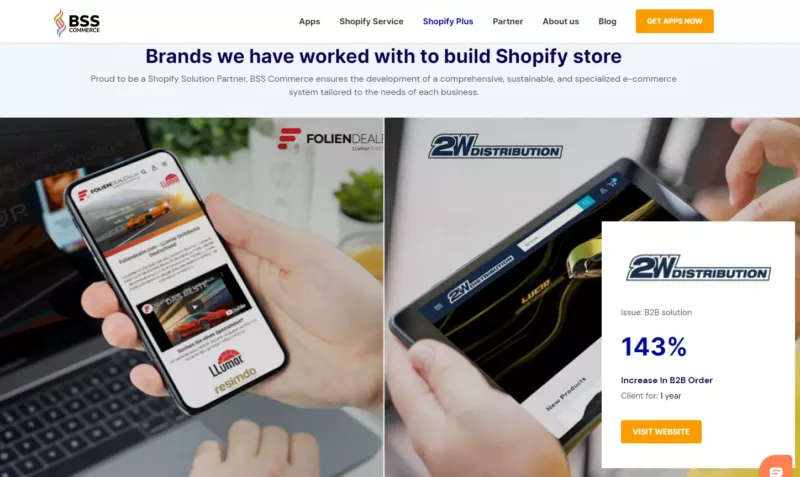
Fulfill Orders Even Faster
Digital transformation, when integrated with COVID-19, has enhanced online growth and B2B eCommerce trends. In the last three months, eCommerce has grown by ten. This quick pace has increased orders, interruptions in supply chains, changes in customer behavior, and other effects.
The quest to reduce click-to-customer cycle time has perhaps impacted the structure of future omnichannel supply chains. The standard for B2B brands continues to rise. Customers, private, and professional buyers demand faster delivery in 2021 and beyond. B2B enterprises must adapt and establish a speedier fulfillment network. A recent McKinsey report shows that logistics is one of the top nine components that create customer value in omnichannel retail.
In 2022, improve your fulfillment strategy by removing friction from the areas of the process that are one of the trends in B2B eCommerce. Here’s a look at what customers value in terms of fulfillment.
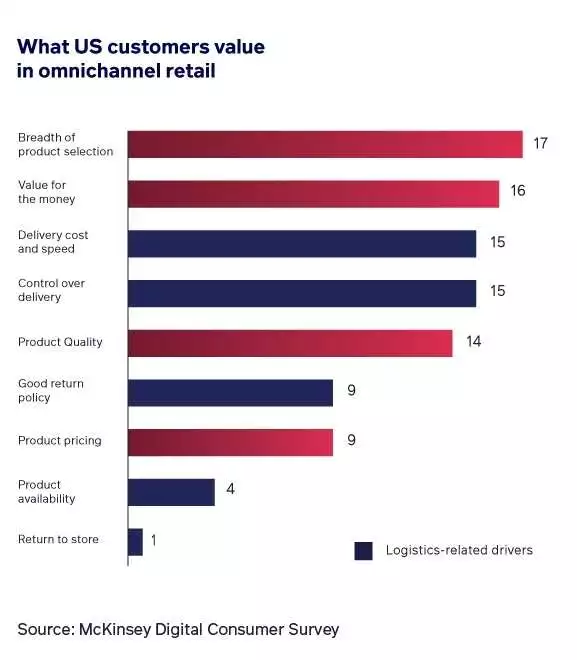
B2B eCommerce Trends: Supply Chain Resilience
Avoiding disruptions in the supply chain is critical to consumer happiness, so supply chain resilience has become one of the prominent B2B eCommerce trends.
Having suppliers nearby and a variety of options in a disruptive incident helps to establish resilience and ensure your organization always has access to new inventory.
Prolonged Resource Shortages
Supply chain disruption will last at least through the third quarter of 2022. Aside from that, money put into economies has led inflation to rise. Meaning expects to pay more in 2022 for the identical item that costs less in 2019. According to Forrester, “shortage” will be even more in 2022.
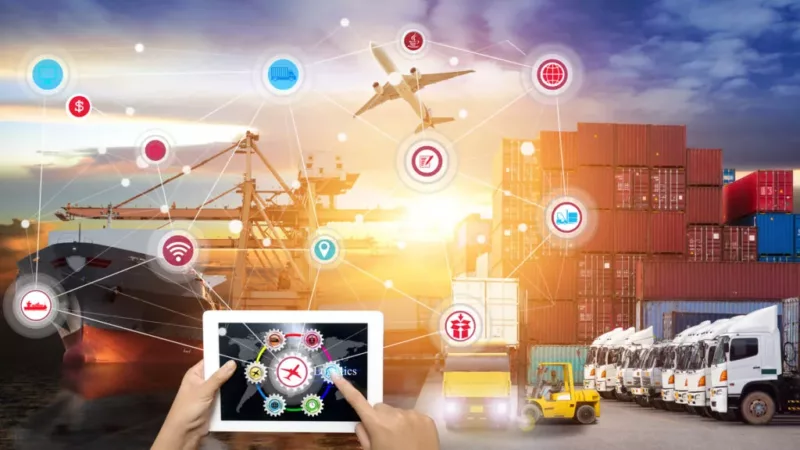
Personnel shortages are another primary resource that has been significantly reduced in 2021 and will continue to affect enterprises well into 2022.
Typically, the US economy adds only 300,000 jobs per month. Analysts estimate that the average number of jobs produced in the last 12 months was roughly 450,000. This number shows a significant drop in labor-force participation. The labor deficit is not limited to the United States. It is a global issue that will have a more considerable influence on B2B enterprises in 2022.
These shortages of commodities and labor will have a knock-on impact. It’s everywhere, from grocery store shelves to high shipping rates and customs. It’s challenging to address these complex difficulties. But eCommerce can let you stay flexible and offer preferred prices and priorities to your customers.
Reshoring
When a company returns production or manufacturing of goods to its home country, this is referred to as reshoring. It is the inverse of offshore when a corporation begins manufacturing and producing items elsewhere to save money.
Because of the global supply chain collapse, businesses are rethinking where they source their commodities. Firms have greater control and are less susceptible to outside forces, such as a worldwide supply chain breakdown when using domestic factories and producers. COVID-19 revealed the flaws in globalizing logistics and manufacturing.
You have more responsible sourcing by bringing home manufacture back into play. However, it can impact pricing and labor costs, so bear that in mind.
New Supply Chain Normal
Supply-chain disruptions, volatility, and uncertainty are all expected to continue. Manufacturers, distributors, and retailers may lose money due to clogged supply chains. McKinsey predicts that B2B delivery volumes will remain stable for the foreseeable future.
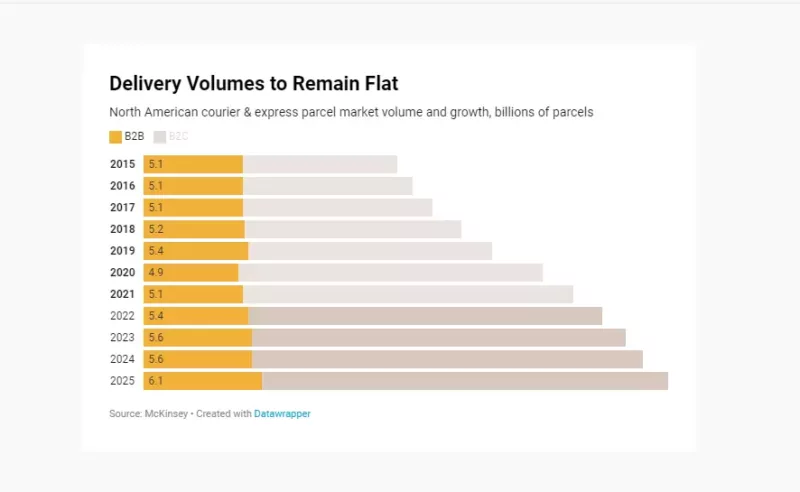 Source: ORO Commerce
Source: ORO Commerce
As a result, brands will prioritize end-to-end visibility into supplier networks, one of the B2B eCommerce trends 2022. To de-risk supply chains and manage capacity restrictions, they seek out various suppliers and fulfillment partners. They may collaborate with multiple freight forwarders, a local carrier, and an independent broker. Also, on-demand warehousing and service providers will be attractive storage alternatives for businesses needing temporary warehouse space.
Conclusion: B2B eCommerce Trends
In general, 2022 (and beyond) will optimize your online experience to meet ever-changing buyer expectations. Keeping this in mind, B2Bs should concentrate on the trends in B2B eCommerce above. For example, abandoning outdated systems, investing in eCommerce technology, personalizing the purchasing experience, and exploring new sales channels.
And while it may appear necessary to prioritize them all, obtaining data about your customers and developing your digital transformation strategy will be the key to success. According to Gartner and other analysts, the only way forward for B2B is more extensive reliance on eCommerce. And also the continuous improvement of the trends and technology witnessed thus far.
Don’t forget that BSS Commerce can help B2B brands elevate your store with a powerful integrated eCommerce solution on Shopify Plus. Contact BSS now for more details!


